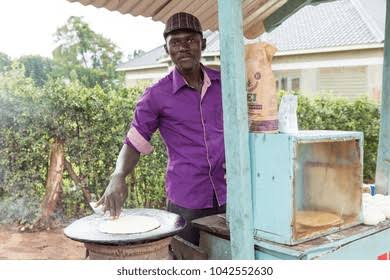I stood on Makerere’s lawns in 2023, my economics degree in hand, the sun warming my cap and gown. The air buzzed with hope—dreams of boardrooms, tailored suits, and a salary to send home to my parents in Jinja. Two years later, I’m kneading dough under a tin roof in Nakasero, the smoke from my chapati stall curling into Kampala’s dusk. The job market chewed up my CVs and spat them out—banks wanted “experience,” NGOs wanted “connections.” Uganda’s economy, they say, grows, but where are the jobs for us?
My first months after graduation were a blur of rejection. I applied to every firm listed on the noticeboards—Stanbic, MTN, even the district offices in Mbale. Each email reply, if it came, was a polite “We regret to inform you.” I’d sit in my rented room, the degree framed above my bed, mocking my empty wallet. My savings dwindled, and my mother’s calls grew worried. “Brian, when will you start?” she’d ask. I had no answer. The pride of my family’s first graduate faded into silence.
Desperation drove me to Nakasero’s streets. I borrowed 50,000 shillings from a friend and bought a second-hand stove, a sack of flour, and eggs. My first chapati stall was a rickety table by the roadside, the smell of sizzling oil drawing curious stares. A former classmate, now a bank teller, laughed as he passed. “Brian, a graduate flipping eggs?” His words burned, but I flipped harder. Each shilling I earned felt like defiance, a stitch in the fabric of my dignity.
The customers—boda riders, market women, tired office workers—became my teachers. Mama Aisha, a vendor, taught me to roll the dough thinner for crispier chapatis. Uncle Juma, a matatu conductor, tipped me extra, saying, “You’re one of us now.” Their smiles rebuilt my pride, outlasting the sting of a payslip I never earned. I saved every coin, dreaming of a catering business, but the weight of unfulfilled promises lingered. I posted on X: *“@KampalaHustler: Graduated with honors, now selling chapati. Uganda’s job market is a joke. #YouthHustle”* (200 likes, 50 retweets). Replies flooded in—@UgJobsNow: “This is our reality. Govt, wake up!”—mirroring my frustration.
One rainy afternoon, Sarah, another graduate hawking groundnuts nearby, joined me under my awning. Her story mirrored mine—Makerere, economics, rejection. “We’re not failures,” I told her, wiping flour from my hands. “We’re builders.” I showed her how to track sales on her phone, a trick I’d learned from a customer. She grinned, planning her own stall. That night, I tweeted: *“@KampalaHustler: Met Sarah today. Another grad hustling. We’re teaching each other to survive. #YouthResilience”* (150 likes, 30 retweets). @Troll256 quipped, “Chapati pays better than most offices anyway,” drawing laughs but also nods of truth.
The stigma faded as my stall grew. Regulars brought friends, and my chapatis—spiced with a secret chili blend—gained a reputation. I invested in a second stove, hiring a teenage boy, Peter, whose school fees I now partly cover. His gratitude reminded me of my own dreams. Yet, the contrast stung—my degree gathered dust while my hands shaped dough. I vented on X: *“@KampalaHustler: Feeding Kampala but can’t feed my dreams. Where’s the future for grads? #FixEmployment”* (180 likes, 40 retweets). @UgandaCares responded, “Your hustle inspires. Keep pushing!”—a lifeline in the digital noise.
Community became my classroom. A customer, Mr. Kato, an accountant, advised me on taxes, turning my earnings into a small savings account. Another, Aunt Grace, shared recipes, expanding my menu to include Rolex. These lessons, born of necessity, outshone my university lectures. I posted a photo of my stall: *“@KampalaHustler: From degree to dough. Proud of this grind. #HustleHard”* (220 likes, 55 retweets). @KlaYouth cheered, “Brian, you’re a king!”—a crown I wore with mixed pride.
But the systemic rot gnawed at me. Why must we beg for what our degrees promised? I attended a youth forum in Kampala, where graduates shared stories—teaching without pay, hawking in traffic, coding for peanuts. We drafted a petition for job creation, and I tweeted: *“@KampalaHustler: At a youth forum. We demand jobs, not crumbs. Sign our petition! #YouthDemand”* (250 likes, 60 retweets). @UgandaGov replied vaguely, “We’re working on it,” but the silence afterward spoke louder.
One evening, a customer, Dr. Namutebi, a lecturer, sat with me. “You’re doing what the system won’t,” she said, sipping tea. “Turn this into a movement.” Inspired, I started a WhatsApp group, “Grad Hustlers,” connecting jobless graduates to skills—sewing, baking, coding. We shared tips, pooled resources, and grew. I posted: *“@KampalaHustler: Launched Grad Hustlers. Together, we rise. Join us! #YouthUnity”* (300 likes, 70 retweets). @MbaleGrad: “Signed up! Let’s build our future!”—a spark of collective hope.
Yet, the struggle persists. Last month, a recruiter called, offering a clerk job at half my expected pay. I declined, my stall now earning more. But the choice haunted me—hustle or humiliation? I reflected on X: *“@KampalaHustler: Turned down a lowball job offer. My stall’s my dignity. But when will Uganda value us? #GradStruggle”* (200 likes, 45 retweets). @Cynic256: “System’s broken. Hustle on, bro,”—a bitter truth.
Now, I stand at my stall, the city’s hum my soundtrack. My savings grow, and Peter’s in school. Sarah’s groundnut business thrives, thanks to my advice. We’re not just surviving; we’re rewriting survival. But I wonder—will my children need degrees, or will they inherit this grind? The river of opportunity in Uganda runs dry for too many. I’ll keep kneading, keep hoping, keep tweeting. The hustle isn’t just mine—it’s ours.
This post was created with our nice and easy submission form. Create your post!




